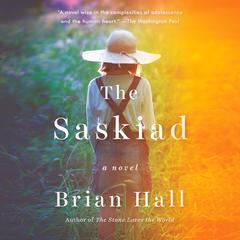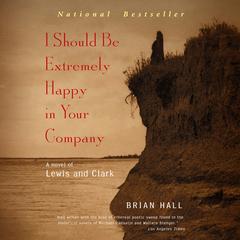Quick Stats About this Audiobook
Total Audiobook Chapters:
Longest Chapter Length:
Shortest Chapter Length:
Average Chapter Length:
Audiobooks by this Author:
Publisher Description
In his most recent novel, I Should Be Extremely Happy in Your Company, Brian Hall won acclaim for the way he used the intimate, revelatory voice of fiction to capture the half-hidden personal stories of the Lewis and Clark expedition. In his new novel, Hall turns to the life of Robert Frost, arguably America's most well-known poet. Frost, as both a man and an artist, was toughened by a hard life. His own father died when Frost was eleven; his only sibling, a sister, had to be institutionalized; and of his five children, one died before the age of four, one committed suicide, one went insane, and one died in childbirth.
Told in short chapters, each of which presents an emblematic incident with intensity and immediacy, Hall's novel deftly weaves together the earlier parts of Frost's life with his final year, 1962, when, at age eighty-eight and under the looming threat of the Cuban Missile Crisis, he made a visit to Russia and met with Nikita Khrushchev.
As Hall shows, Frost determined early on that he would not succumb to the tragedies life threw at him. The deaths of his children were forms of his own death from which he resurrected himself through poetry—for him, the preeminent symbol of man's form-giving power.
A searing, exquisitely constructed portrait of one man's rages, guilt, paranoia, and sheer, defiant persistence, as well as an exploration of why good people suffer unjustly and how art is born from that unanswerable question, Fall of Frost is a magnificent work that further confirms Hall's status as one of the most talented novelists at work today.
Download and start listening now!
"I read this book for my reading group and found that I really liked it. The style of writing was somewhat different, but I thought it left me wondering but never bored. I would like to read more about Robert Frost after reading this fictional account of his life (mostly based on facts)."
— Paulette (4 out of 5 stars)
Quotes
-
Hall gets deep into Frost's head, an approach that brings a startling immediacy to a complex figure many know only as the author of classics like The Road Not Taken.
— Publishers Weekly -
“Hall gets deep into Frost’s head, an approach that brings a startling immediacy to a complex figure many know only as the author of classics like ‘The Road Not Taken.’”
— Publishers Weekly -
“An ambitious and unusual project, a novel that limits itself to documented moments of Robert Frost’s life, including actual dialogue and excerpts from poems and letters…It is Frost’s famously intimate understanding of nature that Hall conveys most lucidly.”
— Booklist
Fall of Frost Listener Reviews
-
" Random scenes of the poet's life, culled from other bios. Read the poems (largely not included here) instead. "
— Don, 12/9/2013 -
" I actually didn't finish. I can appreciate what the writer was trying to accomplish, but the writing and format of the story (fragmented story lines jumping all over time and place) was tiresome. "
— Apryl, 12/6/2013 -
" Gorgeous and intelligent historical fiction. "
— Selma, 2/23/2013 -
" I love the poetry of Frost and this book was a disappointment because I wanted to learn more on Frost than was written. "
— Wendy, 6/26/2012 -
" Extremely disjointed, hard to follow, and obscure. "
— Eileen, 6/14/2012 -
" Don't bother....slogged my way to the end, but all in all a dismal read...... "
— Ginny, 6/9/2012 -
" Is this how life replays itself as we get older? Memories pulled as if from a shuffled stack of cards, the chronology skewed, glimpses of past and present jumbled together... "
— Rachel, 10/7/2011 -
" One of the few books I couldn't finish. I just couldn't get into the disjointed prose throughout the book. I finally gave up about 200 pages into it. I would have enjoyed a more straight forward story of Robert Frost's life. "
— Jennifer, 4/13/2011 -
" I was lost almost the whole time plot-wise but between Frost's language and Hall's it hardly mattered. "
— Amanda, 2/25/2011 -
" Had the potential to be cool but was disappointing. The author had a hard time keeping the flow, to the point where it was distracting. The material itself was good but the presentation was lousy. "
— Jess, 8/7/2010 -
" I actually didn't finish. I can appreciate what the writer was trying to accomplish, but the writing and format of the story (fragmented story lines jumping all over time and place) was tiresome. "
— Apryl, 6/18/2010 -
" I was lost almost the whole time plot-wise but between Frost's language and Hall's it hardly mattered. "
— Amanda, 4/30/2010 -
" Is this how life replays itself as we get older? Memories pulled as if from a shuffled stack of cards, the chronology skewed, glimpses of past and present jumbled together... <br/> "
— Rachel, 1/15/2010 -
" I love the poetry of Frost and this book was a disappointment because I wanted to learn more on Frost than was written. "
— Wendy, 8/17/2009 -
" Had the potential to be cool but was disappointing. The author had a hard time keeping the flow, to the point where it was distracting. The material itself was good but the presentation was lousy. "
— Jess, 12/28/2008 -
" Don't bother....slogged my way to the end, but all in all a dismal read...... "
— Ginny, 10/19/2008 -
" Extremely disjointed, hard to follow, and obscure. "
— Eileen, 5/22/2008
About Brian Hall
Brian Hall is the author of the novels Madeleine’s World, The Saskiad, and the acclaimed story of the Lewis and Clark expedition, I Should Be Extremely Happy in Your Company, as well as three books of nonfiction. His journalism has appeared in Time, the New Yorker, and the New York Times Magazine.
About Dick Hill
Dick Hill, named a Golden Voice by AudioFile magazine, is one of the most awarded narrators in the business, having earned several Audie Awards and thirty-four AudioFile Earphones Awards. In addition to narrating, he has both acted in and written for the theater.







